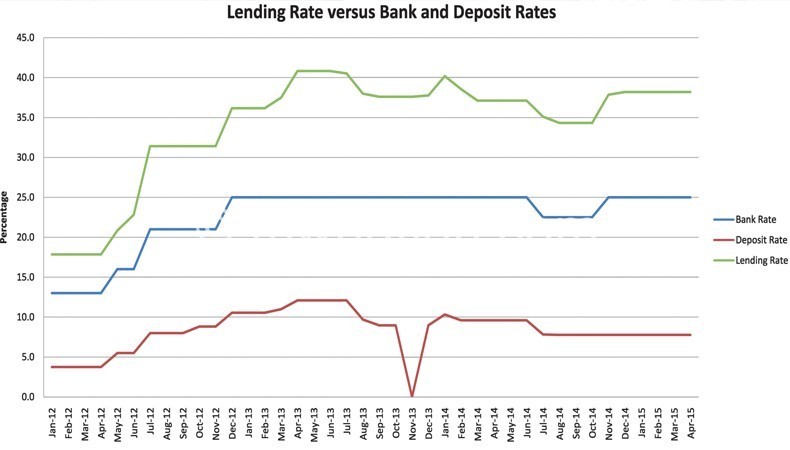BAM rues bank lending rates
Bankers Association of Malawi (BAM), a grouping of the country’s 12 commercial banks, has said it sympathises with the business community on the prevailing high cost of doing business emanating from high lending rates.
“At the current levels of interest rates, it is very difficult to survive as a business,” said BAM president Misheck Esau in an interview on the sidelines of the just-ended 2015 Malawi Investment Forum (MIF) in Lilongwe.
During the forum, most delegates, through their respective sectoral cluster meetings, repeatedly bemoaned high cost of finance among commercial banks as one key deterrent to attracting more potential investors into the country.
Interest rates are hovering above 40 percent in most commercial banks despite the central bank’s policy rate or benchmark rate being at 25 percent since October 2014. This is against a savings rate of 7.8 percent.
In recent times, commercial banks have intensified repossessions of assets, especially houses as businesses are grappling to generate enough money to cope with the high cost of finance at prevailing levels.
“Four years of interest rates of about 25 percent is too long a time. Something needs to be done and soon,” said Esau, who is also chief executive officer for CDH Investment Bank (CDHIB).
He, however, stated that the biggest source of high interest rates in Malawi is the prevailing level of inflation which he said is linked to the level of government spending.
Esau said government has been surviving on borrowing from the domestic market in the wake of withdrawal of direct budget support in 2013 by major donors following Cashgate, the looting of billions of public money at Capital Hill in Lilongwe now expected to be K577 billion ($1.3 million).
“Until government puts its act in order, high inflation will continue to prevail and there may not be a solution soon for as long as the government finances are not balancing,” he said, questioning government’s decision to ban maize exports which he said has also fuelled high rates of inflation.
“When you politicise a crop that is so important to inflation due to its contribution to food inflation, you cannot avoid having shortages because commercial producers shun the crop,” he said.
Esau said there is need to lift export bans on all crops, a move he hoped could promote production of various crops through increased markets.
Malawi Confederation of Chambers of Commerce and Industry (MCCCI) chief executive officer Chancellor Kaferapanjira said during the opening of the forum that high cost of finance is hitting hard businesses, noting that banks in the country concentrate on short-term lending.
Minister of Agriculture, Irrigation and Water Development Allan Chiyembekeza also admitted that high cost of borrowing is denying farmers the much-needed capital and said soon government will be meeting with local banks to address the situation.






Reserve Bank of Malawi is sleeping, so too is the government!
40% interest rate is too much. For borrowing companies to properly cushion this, they need a profit margin of at least 40% as well and I doubt if there are companies in Malawi apart from Banks themselves who are enjoying such a profit margin.
Are deposits really important in bank lending or banks depend on borrowing from RBM in order to lend to the public. If the banks have a large chunk of their lending from depositors, its really unfair advantage considering the spread. unfortunately its the same depositors who come to borrow from the banks. I wonder if introducing mutual banks can help